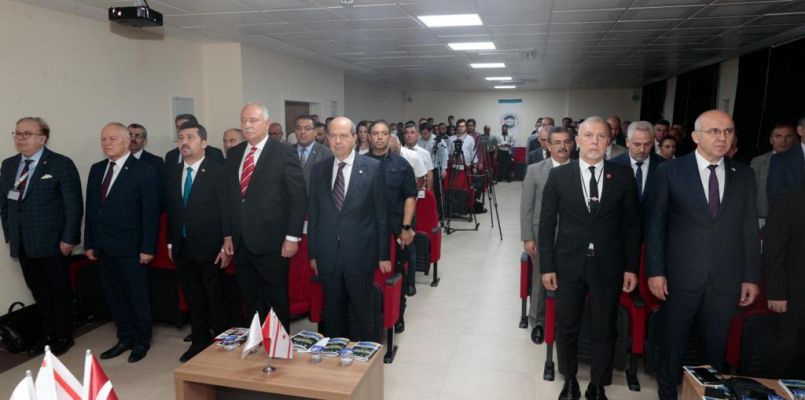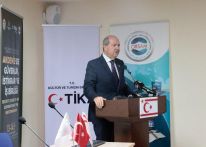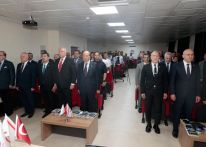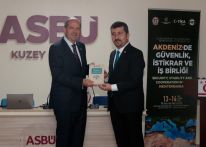President Ersin Tatar participates in the International Symposium on Security, Stability and Cooperation in the Mediterranean

“We must defend the legitimate rights, sovereignty and State of the Turkish Cypriot people.”
Photos
President Ersin Tatar participated in the Symposium on Security, Stability and Cooperation in the Mediterranean that was held at the Social Sciences University of Ankara (ASBU).
Addressing the symposium, President Tatar stated that the geopolitical environment in the eastern Mediterranean and the developments and changing conjuncture have paved the way for the TRNC to take its place in the world.
Underlining that the “Turkish Cypriot People who have inherent sovereign equality rights on the island of Cyprus,” the President stated that “Turkish Cypriots have their own independent State following many years of struggling to exist with the support of Motherland Türkiye, despite the acts of genocide and attempts to make Cyprus a Greek island”.
“Our State is continuing to grow and develop, and its importance and status is increasing due to the geopolitical environment in the region,” the President said.
President Tatar added that the Republic of Türkiye and the TRNC attributed great importance to the maritime rights and Blue Homeland, as well as to airspace rights.“The Turkish nation has a strong, prominent presence in the region which has indeed been strengthened following the proactive initiatives carried out by Republic of Türkiye and the recent signing of the treaty with Libya,” President Tatar said.
“We will not be dragged into federal based negotiations that have failed time and time again”
President Tatar pointed to the armament activities by the Greek-Greek Cypriot duo that is further escalating tensions in the region, adding that the Republic of Türkiye and the TRNC are “taking counter measures and increasing their dominance in the region”.
He said the Turkish Cypriot Side will “not be dragged into federal based negotiations that have failed time and time again,” adding that the TRNC, under his Presidency, is putting forward a new vision that is based on the sovereign equality and equal international status of the Turkish Cypriot People. He said this position is “fully supported by the Republic of Türkiye, and is aimed at reaching sustainable peace and stability in Cyprus and the region through the cooperative relationship of the two Sides on the island”.
President Tatar added that efforts are being made to ease the inhuman isolation imposed on the TRNC and for the formal recognition of the TRNC, which was the invitation extended to the international community by the Republic of Türkiye President Recep Tayyip Erdoğan, during his address at the UN General Assembly in New York.
“We will protect our territory”
President Tatar stated that there will be “no back peddling” with regards to the call for the formal recognition of the TRNC, and he called for unity to be shown with regards to the new policy of the Turkish Cypriot Side that defends the legitimate rights, sovereignty and State of the Turkish Cypriot People.
“We should be united for this common aim because Turkish Cypriot People are as sovereign as the Greek Cypriot People. . .neither side can rule over the other,” the President added. President Tatar said: “However, the Greek Cypriot Side have consistently rejected previous settlement plans and ideas that were based on a federal structure, and negotiations on this basis has been exhausted.”
Cooperation proposals conveyed to the Greek Cypriot Side
Stating that the Greek-Greek Cypriot duo have never accepted sharing power and prosperity with the Turkish Cypriot People, President Tatar stated that he had conveyed two separate letters to the Greek Cypriot leader Nicos Anastasiades in July this year, which provided for ways the two sides can cooperate across different fields. He said one of these proposals was on cooperating on the hydrocarbon issue and the establishment of a joint committee between the two Sides that would be tasked with exploration and exploitation of energy resources and its equal sharing. The President said this would be a win-win for everybody and would pave the way to turning an issue of conflict into an issue of cooperation and benefit.
President Tatar also touched upon the issue of having an interconnection system to the EU via the Republic of Türkiye.
“Having an interconnection that links up our power grids to the rest of the EU via Türkiye is feasible, because the island of Cyprus is located just 40 miles away from the Turkish mainland,” he said. “Having an interconnection system will provide stability, security and cooperation in the region. . .”
President Tatar stated that in another cooperation proposal, the Turkish Cypriot Side has stated that fresh water, piped under an 80km undersea pipeline from Anamur, Türkiye to the Geçitköy dam, can be shared with the Greek Cypriot Side. “Water is becoming for important than many other resources,” the President said.
The President said that the Greek Cypriot Side has never formally responded to cooperation proposals he has made but was in an attempt at making so-called ‘Confidence Building Measures’ which aimed at extending the authority of the Greek Cypriot Side into TRNC territory.
President Tatar stated that he has made many calls to the international community to “end the inhuman isolation on the Turkish Cypriot people, whose right to life and develop is being violated,” adding that the “international community has an obligation to honour the promises to end the restrictions on Turkish Cypriots, to allow our people to trade directly through our own ports and travel directly to our own airport”.
“I wish to emphasise the importance that the Turkish Cypriot people are an integral part of the Turkish world. . .and we are hoping to become an observer member of the Organisation of Turkic States,” President Tatar said.
Noting that the TRNC will continue to be a sovereign State in this region with the support of the Republic of Türkiye, President Tatar said that they are ready to work for sustainable peace and stability in the region through a structured cooperative relationship of two States.
Addressing the symposium, President Tatar stated that the geopolitical environment in the eastern Mediterranean and the developments and changing conjuncture have paved the way for the TRNC to take its place in the world.
Underlining that the “Turkish Cypriot People who have inherent sovereign equality rights on the island of Cyprus,” the President stated that “Turkish Cypriots have their own independent State following many years of struggling to exist with the support of Motherland Türkiye, despite the acts of genocide and attempts to make Cyprus a Greek island”.
“Our State is continuing to grow and develop, and its importance and status is increasing due to the geopolitical environment in the region,” the President said.
President Tatar added that the Republic of Türkiye and the TRNC attributed great importance to the maritime rights and Blue Homeland, as well as to airspace rights.“The Turkish nation has a strong, prominent presence in the region which has indeed been strengthened following the proactive initiatives carried out by Republic of Türkiye and the recent signing of the treaty with Libya,” President Tatar said.
“We will not be dragged into federal based negotiations that have failed time and time again”
President Tatar pointed to the armament activities by the Greek-Greek Cypriot duo that is further escalating tensions in the region, adding that the Republic of Türkiye and the TRNC are “taking counter measures and increasing their dominance in the region”.
He said the Turkish Cypriot Side will “not be dragged into federal based negotiations that have failed time and time again,” adding that the TRNC, under his Presidency, is putting forward a new vision that is based on the sovereign equality and equal international status of the Turkish Cypriot People. He said this position is “fully supported by the Republic of Türkiye, and is aimed at reaching sustainable peace and stability in Cyprus and the region through the cooperative relationship of the two Sides on the island”.
President Tatar added that efforts are being made to ease the inhuman isolation imposed on the TRNC and for the formal recognition of the TRNC, which was the invitation extended to the international community by the Republic of Türkiye President Recep Tayyip Erdoğan, during his address at the UN General Assembly in New York.
“We will protect our territory”
President Tatar stated that there will be “no back peddling” with regards to the call for the formal recognition of the TRNC, and he called for unity to be shown with regards to the new policy of the Turkish Cypriot Side that defends the legitimate rights, sovereignty and State of the Turkish Cypriot People.
“We should be united for this common aim because Turkish Cypriot People are as sovereign as the Greek Cypriot People. . .neither side can rule over the other,” the President added. President Tatar said: “However, the Greek Cypriot Side have consistently rejected previous settlement plans and ideas that were based on a federal structure, and negotiations on this basis has been exhausted.”
Cooperation proposals conveyed to the Greek Cypriot Side
Stating that the Greek-Greek Cypriot duo have never accepted sharing power and prosperity with the Turkish Cypriot People, President Tatar stated that he had conveyed two separate letters to the Greek Cypriot leader Nicos Anastasiades in July this year, which provided for ways the two sides can cooperate across different fields. He said one of these proposals was on cooperating on the hydrocarbon issue and the establishment of a joint committee between the two Sides that would be tasked with exploration and exploitation of energy resources and its equal sharing. The President said this would be a win-win for everybody and would pave the way to turning an issue of conflict into an issue of cooperation and benefit.
President Tatar also touched upon the issue of having an interconnection system to the EU via the Republic of Türkiye.
“Having an interconnection that links up our power grids to the rest of the EU via Türkiye is feasible, because the island of Cyprus is located just 40 miles away from the Turkish mainland,” he said. “Having an interconnection system will provide stability, security and cooperation in the region. . .”
President Tatar stated that in another cooperation proposal, the Turkish Cypriot Side has stated that fresh water, piped under an 80km undersea pipeline from Anamur, Türkiye to the Geçitköy dam, can be shared with the Greek Cypriot Side. “Water is becoming for important than many other resources,” the President said.
The President said that the Greek Cypriot Side has never formally responded to cooperation proposals he has made but was in an attempt at making so-called ‘Confidence Building Measures’ which aimed at extending the authority of the Greek Cypriot Side into TRNC territory.
President Tatar stated that he has made many calls to the international community to “end the inhuman isolation on the Turkish Cypriot people, whose right to life and develop is being violated,” adding that the “international community has an obligation to honour the promises to end the restrictions on Turkish Cypriots, to allow our people to trade directly through our own ports and travel directly to our own airport”.
“I wish to emphasise the importance that the Turkish Cypriot people are an integral part of the Turkish world. . .and we are hoping to become an observer member of the Organisation of Turkic States,” President Tatar said.
Noting that the TRNC will continue to be a sovereign State in this region with the support of the Republic of Türkiye, President Tatar said that they are ready to work for sustainable peace and stability in the region through a structured cooperative relationship of two States.




